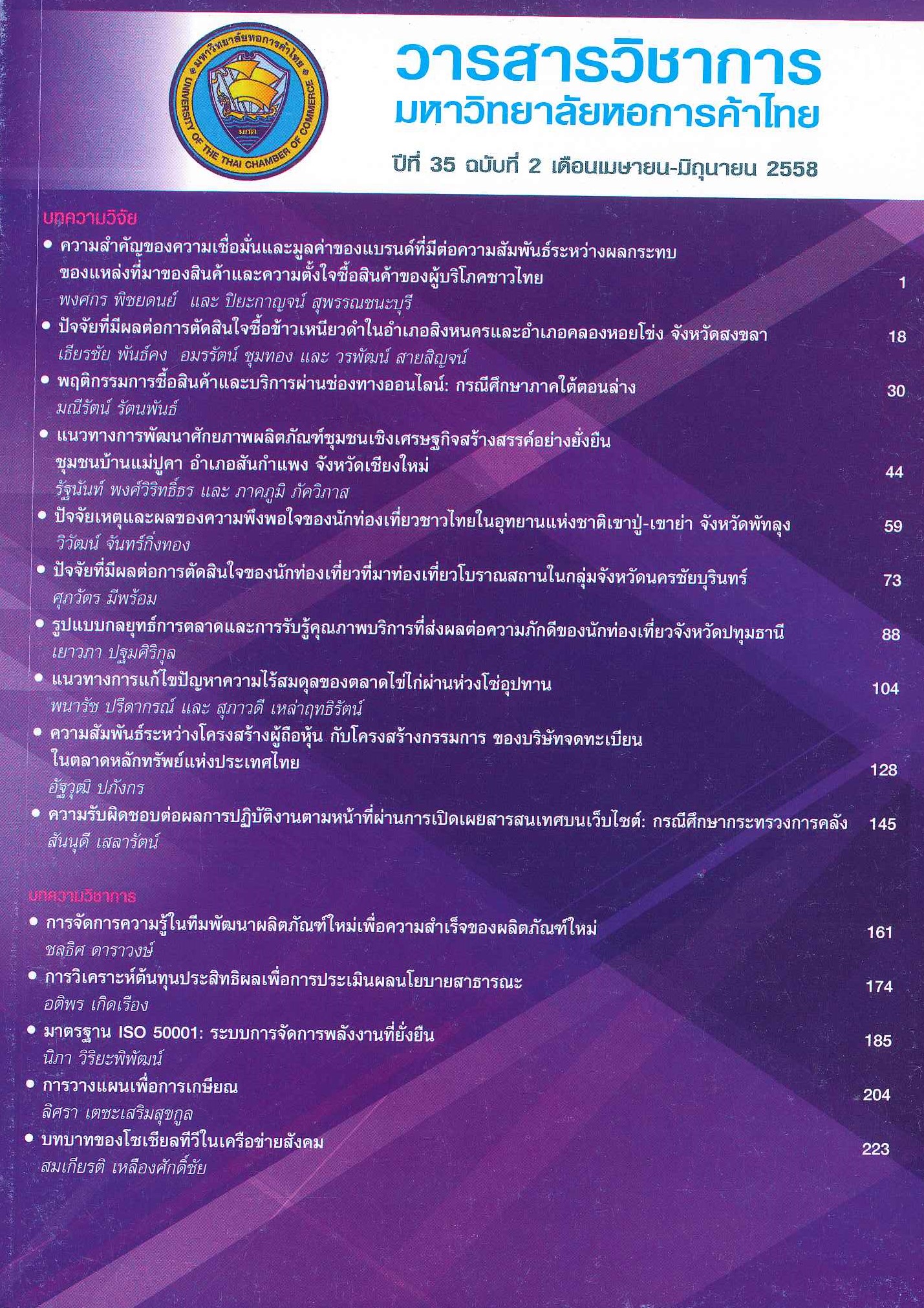The Effects of Country of Origin on Purchase Intention of Thai Consumers: The Moderation of Trusting Beliefs and Brand Equity
Main Article Content
Abstract
Companies around the world are seeking ways to maximize their profit. The option most selected is to move the production-base to low-cost countries. However, there is a question about the product quality as, generally, the Country-of-Origin (COO) is considered an extrinsic product cue in consumer product evaluation. For Thai consumers, Made in China still has a strong impact on their product evaluation, since Thai consumers prefer the Made in Thailand label over a Made in China label. COO has been defined as "the country in which the product is made". Hence, the main aim of this research is to develop strategies that can lessen the effect of the COO on consumer
product evaluation and purchase intention.
Article Details

This work is licensed under a Creative Commons Attribution-NonCommercial-NoDerivatives 4.0 International License.
ลิขสิทธิ์ของบทความ
ผลงานที่ได้รับการตีพิมพ์ถือเป็นลิขสิทธิ์ของมหาวิทยาลัยหอการค้าไทย ห้ามมิให้นำเนื้อหา ทัศนะ หรือข้อคิดเห็นใด ๆ ของผลงานไปทำซ้ำ ดัดแปลง หรือเผยแพร่ ไม่ว่าทั้งหมดหรือบางส่วนโดยไม่ได้รับอนุญาตเป็นลายลักษณ์อักษรจากมหาวิทยาลัยหอการค้าไทยก่อน
References
Intention." Journal of Asia- Pacific Business 5, 3: 27-43.
Bilkey, W.J. and Nes, E. 1982. "Country of Origin Effects on Product Evaluations." Journal of International Business dies 13, 1: 89-99.
Cordell, V.V. 1992. "Effects of Consumer Preferences for Foreign Sourced Products." Journal of International Business Studies 23, 2: 251-269.
De Wulf, K. et al. 2005. "Consumer Perceptions of Store Brands Versus National Brands." Journal of Consumer Marketing 22, 4: 223-232.
Eamlaorpakdee, Pranee. 2009. "Role of Brand Identity in Determining the Popularity of Brand Reputation." University of the Thai Chamber of Commerce Journal
29, 3: 183-192 (in Thai).
ปราณี เอี่ยมละออภักดี. 2552. "บทบาทของเอกลักษณ์ตราสินค้าในการกำหนดความนิยมในตราสินค้าที่มีชื่อเสียง." วารสารวิชาการ มหาวิทยาลัยหอการค้าไทย 29, 3: 183-192.
Erickson, G.M. Johansson, J.K. and Chao, P. 1984. "Image Variables in Multi-Attitude Product Evaluations: Country-Of-Origin Effects." Journal of Consumer Research 11, 2: 694-699.
Fishbein, M. and Ajzen, I. 1975. Belief, Attitude,Intention, and Behavior: An Introduction to Theory and Research. Reading. MA: Addison-Wesley.
Forza, C. 2002. "Survey Research in Operations Management: A Process-Based Perspective." International Journal of Operations and Production Management 22, 2: 152-194.
Han, C.M. 1989. "Country Image or Summary Construct?" Journal of Marketing Research 26, 2: 222-229.
Hair, Joseph F.Jr., Bush, R.P. and Ortinau, D.J. 2003. Marketing Research Within a Changing Information Environment. 2nd ed. New York: McGraw-Hill/Irwin.
Hsieh, M.H., Pan, S.L. and Setiono, R. 2004. "Product-, Corporate-, and Country- Image Dimensions and Purchase Behavior: A Multicountry Analysis." Journal of the Academy of Marketing Science 32, 3: 251-270.
Hui, M.K. and Zhou, L. 2003. "Country-Of-Manufacture Effects for Known Brands." European Journal of Marketing 37, 1/2: 133-153.
Johansson, J.K. and Thorelli H.B. 1985. "International Product Positioning." Journal of International Business dies 16, 3: 57-75.
Kabadayi, S. and Lerman, D. 2011. "Made in China But Sold at FAO Schwarz: Country-Of-Origin Effect and Trusting Beliefs." International Marketing Review 28, 1: 102-126.
Kotler, P. 2000. Marketing Management: Analysis, Planning, Implementation and Control. 10th ed. Englewood Cliffs, NJ: Prentice-Hall.
Koubaa, Y. 2008. "Country Of Origin, Brand Image Perception, and Brand Image Structure." Asia Pacific Journal of Marketing and Logistics 20, 2: 139-55.
Mayer, R.C., Davis, J.H. and Schoorman, F.D. 1995. "An Integrative Model of Organizational Trust." Academy of Management Review 20, 3: 709-734.
McKight, D.C., Choudhury, V. and Kacmar, C. 2002. "Developing and Validating Trust Measures for E-Commerce: An Integrative Typology." Information Systems Research 13, 3: 334-359.
McKnight, D.H. and Chervany, N.L. 2001. "What Trust Means in E-Commerce Customer Relationships: An lnterdisciplinary Conceptual Typology." International
Journal of Electronic Commerce 6, 2: 35-59.
Nagashima, A. 1977. "A Comparative 'Made in' Product Image Survey Among Japanese Businessmen." Journal of Marketing 41, 3: 95-100.
Roth, M.S. and Romeo, J.B. 1997. "Matching Product and Country Image Perceptions: A Framework for Managing Country- Of-Origin Effects." Journal of International Business Studie 23, 3: 477-497.
Rungkasiri, T. 2008. "Attitudes and Perception of Thai Consumers in Bangkok Metropolitan Towards Made-in-China Products." Chulalongkorn Business Review 30. 3-4: 126-144.
Samii, A.G. 1995. International Consumer Behaviour: Its Impact on Marketing Strategy Development. Westpoint, GT: Quorum Books.
Thailand Textile and Clothing. April 13,2012. Thailand Textile Institute [Online]. Available: https://www.thaitextile.org/ iu_backup/Status_index.php


